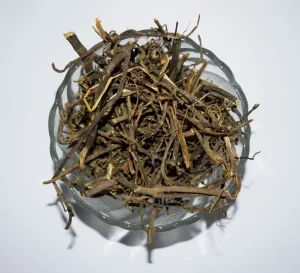
Nagarmotha is an Ayurvedic herb used for centuries in Indian medicine to treat various health conditions. Its scientific name is Cyperus rotundus. This complete guide will explore everything you need to know about Nagarmotha – from its many health benefits and uses to the recommended dosage, precautions to take, and more. Whether you are new to Ayurveda or looking to expand your knowledge of herbs, this guide will inform you thoroughly about this lesser-known but powerful medicinal plant.
The Medicinal Properties of Nagarmotha
- It is most commonly used for treating digestive issues like irregular bowel movements, gas, bloating, and abdominal pain.
- Nagarmotha has antioxidant and anti-inflammatory properties that help alleviate inflammation and pain. (1)
- It is also helpful for treating symptoms associated with PMS, like painful menstruation and mood changes.
- Women use the herb to regulate irregular periods and menstrual cycles as well
- In ayurveda, nagarmotha helps balance all 3 doshas – vata, pitta and Kapha, making it beneficial for people of all body types.
- It is generally considered safe when taken under the guidance of an Ayurvedic practitioner, however, it is best avoided during pregnancy.
- Nagarmotha is usually given in powder form or as an ingredient in Ayurvedic formulations and remedies.
Parts Used for Remedies
- Rhizomes – The underground stems or root-like thickened tuberous parts contain beneficial oils aiding digestion plus female health when brewed into soups or tea in moderation.
- Roots – Fibrous, intense, aromatic roots of the Cypeurvine plant yield oils too for alleviating diseases ranging from fevers and body aches to dental issues historically after careful processing.
- Leaves – Interestingly, external topical application of the long leaves as a poultice or paste relieves muscle soreness, swelling and dermatological conditions due to bioactive vapours.
- Seeds – Further investigation reveals even tiny Nagarmotha seeds hold antioxidant, antifungal and antibacterial potentials unexplored, which may serve medication development someday – though not recommended currently for direct human consumption due to toxicity constraints at higher amounts.
How to use Nagarmotha?
Nagarmotha comes in two main forms: powdered churna or capsules.
To take the churna:
- Use 1⁄4 to 1⁄2 teaspoon per dose.
- Mix the powder into honey or water to help it go down smoothly.
- Take it this way twice daily, after meals.
The capsule option involves swallowing 1-2 capsules at a time with water. Again, take Nagarmotha capsules twice daily – once after lunch and once after dinner works well.
Dosage of Nagarmotha
For adults, typical usage involves taking 10-20 ml (2-4 teaspoons approx) of Nagarmotha root extract twice daily – once after breakfast and after dinner- to obtain benefits related to digestion and gastric issues.
Health Benefits of Nagarmotha
Nagarmotha is an ancient herb that has been used for centuries in Ayurvedic and folk medicine traditions. Modern research confirms many of the traditional uses and purported health benefits of this warming, aromatic herb. Some of the top evidence-based ways that Nagarmotha may support health include:
1. Helps Digestion
Nagarmotha stimulates the production of gastric juices and bile, which help to break down food properly. It also helps relieve common digestion problems like gas, bloating and constipation. Overall, nagarmotha improves digestion by optimising the digestive process from start to finish.
2. Aids Weight Loss
Nagarmotha is thought to boost metabolism, helping you burn more calories naturally (2). It may also suppress appetite and cravings, making it easier to reduce calorie intake. Together, these effects make nagarmotha a useful weight loss aid when combined with a healthy diet and exercise.
3. Helps Lactation
Nagarmotha promotes prolactin hormone levels for nursing mothers to boost breast milk production. It is commonly used to improve breast milk supply after giving birth. The herbs contained in nagarmotha support healthy lactation.
4. Provides Respiratory Relief
Nagarmotha helps clear out mucus and opens up airways for improved breathing. With anti-inflammatory and antibacterial properties, it also helps protect respiratory health by reducing infections that cause congestion and coughs. Overall, nagarmotha delivers multifaceted respiratory relief.
5. Helps Regulate Diabetes
Studies show that nagarmotha can improve insulin sensitivity and lower blood sugar levels, making it beneficial for managing diabetes symptoms. The key active compounds help balance blood sugar in healthy and diabetic individuals.
6. Improves Hair Quality
The nourishing herbs in nagarmotha feed hair follicles to stimulate regrowth. The antimicrobial properties also prevent dandruff and reduce hair fall caused by damage or infection. It delivers comprehensive support for optimal hair health and quality.
7. Benefits Skin
Antioxidants in nagarmotha protect the skin from free radical damage that accelerates ageing. It also reduces inflammation, which is responsible for several skin issues. Using nagarmotha can make your skin more supple, youthful and glowing.
8. Relieves Pain
Nagarmotha contains an analgesic compound that can effectively ease inflammatory pain such as joint aches or headaches. By reducing systemic inflammation, it delivers widespread pain relief.
9. Supports Heart Health
The active ingredients in nagarmotha have been shown to lower LDL cholesterol, triglycerides and plaque buildup in arteries. Together, these effects reduce your risk for heart disease and related issues like strokes or blood clots.
10. Has Anti-Cancer Properties
Some research indicates that nagarmotha can protect cells from DNA damage that causes mutation and cancerous growths. It may also help trigger cell death in tumours. While more studies are needed, these anti-cancer abilities show promise.
Precautions of Nagarmotha
- Before using Nagarmotha, ensure you’re not allergic to it. People sensitive to certain grasses might also react to Nagarmotha.
- It’s prudent to avoid use during these times unless a healthcare provider advises.
- Nagarmotha may interact with certain medications. It’s essential to consult with a healthcare professional if you are on medications.
- Since Nagarmotha can affect blood sugar levels and blood clotting, it’s advisable to stop using it at least two weeks before scheduled surgeries to prevent complications.
Side Effects of Nagarmotha
- Some people may experience stomach upset, diarrhoea, or nausea when using Nagarmotha, especially in large doses.
- There is a potential for Nagarmotha to lower blood sugar levels, which can be problematic for people with diabetes or those on blood sugar-lowering medications.
- Excessive or prolonged use of Nagarmotha could potentially impact liver function. (3)
- As a diuretic, Nagarmotha may increase urination, which can lead to dehydration and electrolyte imbalances if not monitored.
Conclusion
When it comes to natural remedies, nagarmotha is a true all-star. This powerful little herb packs a punch for treating digestive troubles, balancing hormones, easing aches and pains, fighting infections, and so much more. With antioxidant and anti-inflammatory benefits galore, it’s no wonder nagarmotha has been relied on in ancient healing traditions for ages. It’s generally very safe when used correctly.
FAQs
1. What is the English name of Nagarmotha?
The English name of Nagarmotha is Cyperus rotundus.
2. Is consuming Nagarmotha Safe?
It’s generally safe when taken in the recommended dosages under medical guidance. But check for allergies first.
3. Can we take Nagarmotha daily?
Depending on your health condition, you can take it daily for short periods as advised by an Ayurvedic doctor. Don’t overdo it.
4. What are the side effects of consuming Nagarmotha?
Possible side effects are stomach discomfort, diarrhea, nausea or interactions with other medicines if taken in very high doses.
5. Where is Nagarmotha found?
It grows naturally in tropical regions of Asia, Africa and Europe. The roots and rhizomes are used for making remedies.
References
3. Excessive or prolonged use of Nagarmotha could potentially impact liver function (ncbi.nlm.nih.gov)

















4 Comments